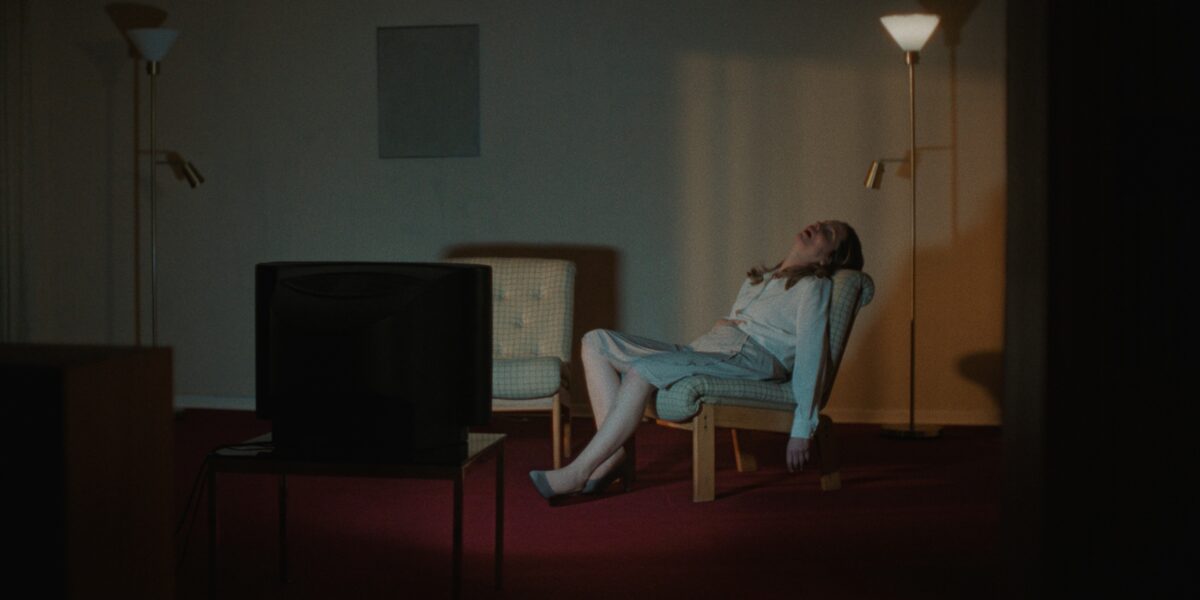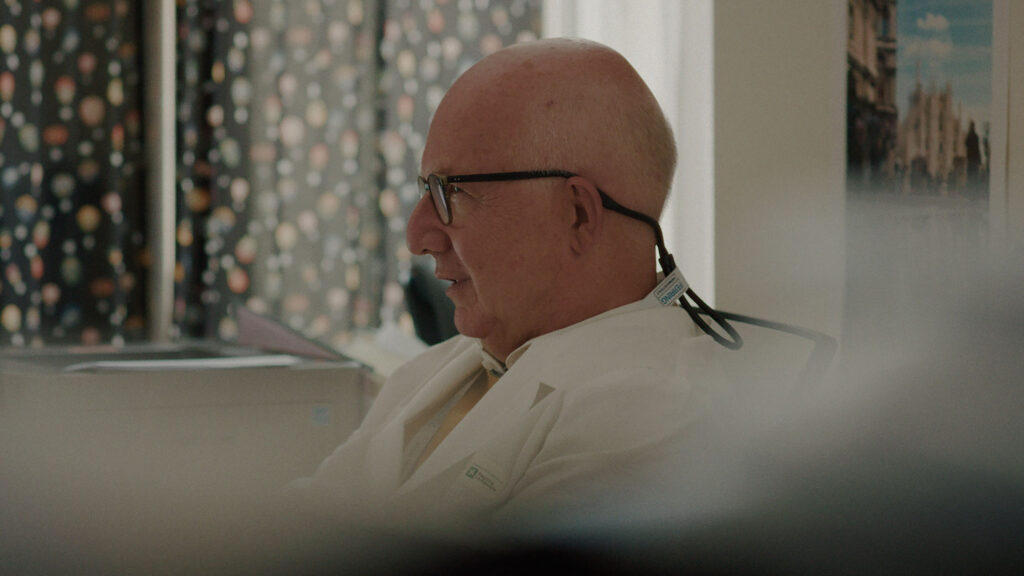The drive from Thessaloniki’s airport into the city begins like any other: car dealerships and furniture stores that give way to bustling street life. Home to over a million people, with a teeming port and the country’s largest university, Thessaloniki is the second-biggest city in Greece with a populace that only grows denser as you wind your way past its Byzantine walls and Roman Rotunda towards the glistening Aegean Sea. Attending the city’s biannual film festivals (documentaries in spring, fiction in fall), I’ve taken this journey several times in the last few years, most recently on a shuttle with Dionysia Kopana, a filmmaker from Athens whose latest, NovaMax Skyland, was premiering the following night. Along the way Kopana spoke about the precarious independent cinema scene in Greece, the earthquake that recently threatened to sink Santorini, and the demonstrations that had been breaking out across the country that week to mark the anniversary of the Tempi Train crash and the government’s subsequent failure to hold anyone responsible.
The Thessaloniki Documentary Festival is not the kind of place one goes to forget the world’s ills. Nestled in the Northwest reaches of the Aegean sea, Thessaloniki rises up from a waterfront walkway that stretches from a 12th-century tower on the eastern end to the cruise-liners and shipping containers of the city’s port. The festival’s main hub operates from a repurposed block just next to them, where warehouses once used in the shipping trade now house a gallery space, a film museum, and multiple modern screening rooms. This year’s artist-in-residence was Lauren Lee McCarthy, whose installation LAUREN: Anybody Home? turned the space into an imitation smart home where McCarthy acted as a kind of human Alexa, prompting visitors to interact with her through cameras and microphones. The piece was part of a new section focusing on the growing influence of A.I. technologies in art, cinema, and the wider world.

About a Hero
The section’s opening film, Piotr Winiewicz’s About a Hero, explored both the possibilities and limitations of artificial intelligence in filmmaking. Inspired by a quote from Werner Herzog (“a computer will not create a film as good as mine in 4,500 years”), Winiewicz fed a learning model with an archive’s worth of the director’s screenplays and interviews before prompting it to write a script. About a Hero combines Winiewicz’s production of this imaginary movie with interviews featuring artists, scientists, and actors, including Stephen Fry. Though Winiewicz initially distinguishes the film’s fictional and documentary elements, the two sides begin to blur and overlap in interesting ways, inviting you to scratch at its surface. That the real Vicky Krieps appears in some sequences only adds intrigue to the invitation. Though for now, at least, Herzog can rest easy.
For all those whispers of future anxieties, some of the most foreboding films on show were those that looked back. The first title I saw was Luuk Bouwman’s The Propagandist: a kind of aural history on Jan Teunissen, the middling filmmaker who became the most powerful player in the Dutch cinema industry during World War II. Featuring audio recordings with an unrepentant Teunissen from the post-war years (he lived to the ripe old age of 77), presented by the historian who interviewed him, Bouwman’s engrossing study positions the man as the Netherlands’ answer to Leni Riefenstahl. You don’t have to see Andres Veitel’s already lauded Riefenstahl (as I did on my final day at TIDF) to know that the reference doesn’t quite warrant Teunissen––much as I expect he would have liked it to––but I recommend watching it all the same. One thing Bouwman and Veitel’s subjects did share was their knack for craven opportunism, an evergreen topic for filmmakers and something of a boom industry at present: enough to make you wonder who amongst today’s sycophants will end up getting this kind of damning archival treatment in future decades.
Both Thessa Docs and its autumnal sister festival award an honorary Golden Alexander for contribution to cinema. This year’s recipient was the French veteran Nicolas Philibert, who gave a masterclass titled “Improvise, an ethical necessity,” though I can’t recall a great deal being said about either. I did, however, catch some info on the health of the documentary scene in France, where Philibert claimed an average of three were being released per week. A recent example Philibert could have noted was Claire Simon’s Elementary. Continuing on from her exceptional Our Body, Simon’s latest swaps the Parisian hospital of Our Body for a Saint-Étienne school to focus on a classroom of children through the later, sunnier weeks of the year. Like recent, similar films from Ruth Beckermann (Favoriten) and Maria Speth (Mr Bachmann and His Class), Elementary has obvious charm to burn but is somewhat hampered by those awkwardly recent comparisons, lacking the central anchoring teacher figure and socio-political nuance that made Beckermann and Speth’s films sing.

GEN_
Gianluca Matarrese’s buoyant GEN_ would make a better chaser to Our Body. The film, one of a few strong contenders I saw in the festival’s International Competition, is a profile of Italian doctor Maurizio Bini, whose evident pleasure in and dedication to helping his patients will inspire feelings of great admiration in many who have had to deal with failing healthcare systems globally in recent years. We only see flashes of Bini in his daily life (mushroom foraging, disco dancing) outside of Milan’s Niguarda public hospital, the film’s focus, where Bini has for decades offered remarkable encouragement, kindness, and knowledge to parents looking into IVF and, more recently, to people seeking gender-affirming surgery. Georgia Meloni’s conservative government is never explicitly mentioned by name, but lingers in the background of Matarrese’s film, and casts Bini’s navigation of the healthcare system’s restrictions in a heroic light. GEN_ follows Bini in the last weeks before retirement, offering the public servant his deserved victory lap that extended to a screening where Bini appeared and was greeted with a standing ovation.
Less uplifting, though no less compelling, was Juanjo Pereira’s Under the Flags, the Sun, a documentary on Alfredo Stroessner, the dictator who ruled Paraguay for 35 years. Pereira’s film is a work of found footage in the truest sense: as much of the country’s media archives from the time have either disappeared or been destroyed, the director was forced to scour the globe for footage. Though spanning much of Stroessner’s reign, arguably the longest unbroken authoritarian rule in history, Pereira prioritizes two astonishing events: the construction of the Itaipu dam and its fallout; and the dictator’s relationship with Josef Mengele, the Nazi angel of death to whom he granted Paraguayan citizenship in 1959. Much to Pereira’s credit, Under the Flags‘ intrinsic importance as historical document takes little away from its filmic qualities: both Perierra’s keen, occasionally surreal editing style and the more primal rush of seeing history rediscovered.
For all those urgent concerns, the very best films I saw were those that lingered with their subjects. Anyone looking for political subtext in Brittany Shyne’s Seeds, winner of this year’s U.S. Documentary award at Sundance, or Albert Serra’s Afternoons of Solitude, winner of the Golden Seashell at San Sebastian last year, will know where to find them. That both films transcend the essentials of their subject matter and reach toward something cosmic is not because of what Shyne and Serra are looking at but the ways in which they look. In getting intimately close and observing from a distance, respectively, their films are further evidence that even the most earth-bound themes––like life, death, the soil beneath our feet––can be ones that lift us off it.
